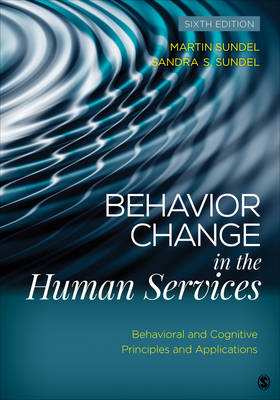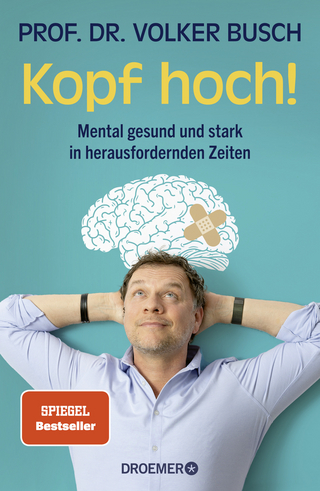
Behavior Change in the Human Services
SAGE Publications Inc (Verlag)
978-1-4833-8461-0 (ISBN)
Using a unique behavioral assessment and treatment planning framework, the updated Sixth Edition provides a systematic overview of behavioral and cognitive principles and their applications to a wide range of issues and situations encountered in human services professions. Up-to-date practice examples drawn from eight diverse case studies illustrate the range and versatility of the behavior change approach in an increasingly diverse and multicultural society, while an innovative chapter on clinical applications of behavioral and cognitive intervention techniques also addresses current influences in the field. This edition embraces the rigorous empirical foundations that have made this approach such a significant contributor to the national and international therapeutic milieu of the 21st century.
Martin Sundel is the director of Clinical Services for Sun Family Care, a company that provides care management and counseling to older adults. He was the Dulak Professor of Social Work at the University of Texas at Arlington and also served on the faculties of the University of Michigan, the University of Louisville, and Florida International University. He holds a PhD in social work and psychology from the University of Michigan and was a postdoctoral fellow at the Laboratory of Community Psychiatry at Harvard Medical School. He is a Charter Clinical Fellow of the Behavior Therapy and Research Society and has been recognized as a pioneer in introducing behavior therapy in Latin America. He has published extensively on the application of behavioral science knowledge to the helping professions. An avid table tennis player, he has won three national championships and silver and bronze medals in international tournaments. Sandra S. Sundel is the president and CEO of Sun Family Care. She was formerly on the social work faculty at Florida Atlantic University. She was executive director of family service agencies in Florida and Texas, and also served as executive director of group homes for adults with developmental disabilities in Texas. She holds an MSSW from the University of Louisville and a PhD in clinical social work from the University of Texas at Arlington. She has taught courses in social work practice, behavior therapy, interpersonal communication, and group work, and has conducted numerous workshops and seminars. She has consulted with corporations, government agencies, and nonprofit organizations on organizational behavior management and interpersonal communication in the workplace. As mental health consultants to the United Nations High Commissioner for Refugees (UNHCR) in Cyprus, Sandra and Martin designed and implemented a psychosocial rehabilitation project to foster collaborative relationships between Greek and Turkish Cypriots.
Preface
To the Student: How to Use This Book
Course Materials
Case Examples
The Chapters
The Course Posttest
Scoring the Pretest and Posttests
Recommendations for Instructor Use of This Book
Introduction
Three Generations of Behavior Change
Origins of the Behavior Change Approach
Characteristics of the Behavior Change Approach
Applications of the Behavior Change Approach
Journals and Professional Organizations
References and Resources
1. Specifying Behavior
Objectives
Overt and Covert Behaviors
Clarifying Vague Terms and Fuzzy Language
Target Behavior
Measuring Response Strength
The Behavioral Assessment Approach
Summary
Suggested Activities
Chapter Posttest Questions
References and Resources
2. Positive Reinforcement
Objectives
Reinforcing Stimuli
Examples of Positive Reinforcement
Reinforcers and Rewards
Factors That Influence Reinforcer Effectiveness
How to Identify Potential Reinforcers
Reinforcer Sampling
How to Evaluate the Effect of a Stimulus as a Positive Reinforcer
Reinforcement of Behavior: Social, Tangible, and Self-Administered
Summary
Suggested Activities
Chapter Posttest Questions
References and Resources
3. Extinction
Objectives
Decreasing Response Strength
Single-Subject Evaluation Designs
Applying Extinction to Decrease Undesired Behaviors
Ethical Considerations
Effects of Extinction
Consistency and Control of Reinforcement
Positive Reinforcement of Appropriate Behaviors
Spontaneous Recovery
Summary
Suggested Activities
Chapter Posttest Questions
References and Resources
4. Positive Reinforcement Contingencies
Objectives
Behavioral Contingencies and Positive Reinforcement
Contingency Contracting
Accidental Reinforcement Contingencies
Self-Control Reinforcement Contingencies
The Premack Principle
Continuous and Intermittent Reinforcement
Characteristics of Various Schedules of Reinforcement
Matching Law
Summary
Suggested Activities
Chapter Posttest Questions
References and Resources
5. Shaping and Response Differentiation
Objectives
Differential Reinforcement
Response Class
The DRO Procedure
Shaping With Successive Approximations
Summary
Suggested Activities
Chapter Posttest Questions
References and Resources
6. Stimulus Control: Discrimination and Generalization
Objectives
Antecedents
The Discrimination Training Procedure
Stimulus Control
Rule-Governed Behavior
Stimulus Fading
Stimulus Generalization
Summary
Suggested Activities
Chapter Posttest Questions
References and Resources
7. Conditioned Reinforcement and Chaining
Objectives
Conditioned Reinforcement
Simple and Generalized Conditioned Reinforcers
Establishing a Conditioned Reinforcer
Reinforcement History
Establishing Relationships With Clients
Fading Out Unconditioned Reinforcers
Token Economy
Stimulus-Response Chains
Developing New Behaviors Using Chaining
Response Priming
Summary
Suggested Activities
Chapter Posttest Questions
References and Resources
8. Modeling and Imitation
Objectives
The Role of Modeling and Imitation in the Acquisition of Behaviors
Modeling Versus Shaping
The Modeling Plus Positive Reinforcement Procedure
Social Skills Training
Assertiveness Training
Summary
Suggested Activities
Chapter Posttest Questions
References and Resources
9. Punishment
Objectives
Punishment Defined
Aversive Stimuli and Punishers
Positive Punishment
Physical Punishment and Spanking
Negative Punishment
Extinction and Negative Punishment
Time-Out
Maximizing the Effectiveness of Punishment
Overcorrection
Punishment and Self-Control
Disadvantages of Punishment
Alternatives to Punishment
The Future of Punishment
Summary
Suggested Activities
Chapter Posttest Questions
References and Resources
10. Negative Reinforcement
Objectives
Negative Reinforcers, Punishers, and Aversive Stimuli
Escape Behavior
Escape and Punishment
Avoidance Behavior
Phobias and Negative Reinforcement
Superstitious Behavior and Negative Reinforcement
Negative Reinforcement and Interpersonal Relationships
Summary
Suggested Activities
Chapter Posttest Questions
References and Resources
11. Respondent Conditioning
Objectives
Respondent Behavior
Respondent Conditioning
Emotional Behavior
Respondent Conditioning of Phobias
Escape, Avoidance, and Respondent Conditioning
Operant and Respondent Control of Behaviors
Summary
Suggested Activities
Chapter Posttest Questions
References and Resources
12. Generalization and Maintenance of Behavior Change
Objectives
Generalization and Maintenance of Behavior Change
Obstacles to the Generalization and Maintenance of Behavior Change
Strategies for Promoting the Generalization and Maintenance of Behavior Change
Summary
Suggested Activities
Chapter Posttest Questions
References and Resources
13. Behavioral Assessment
Objectives
Introduction to Behavioral Assessment
Cultural Diversity and Cultural Competency
Elements of Behavioral Assessment
Collecting RAC-S Data
Interviews and Assessment Instruments
Functional Behavioral Assessment
Identifying Controlling Relationships With RAC-S
Case Study
Summary
Suggested Activities
Chapter Posttest Questions
References and Resources
14. Goal Setting, Intervention Planning, Implementation, and Evaluation
Objectives
Formulating Behavior Change Goals
Developing the Intervention Plan
Implementation of the Behavior Change Program
Evaluating the Effectiveness of the Behavior Change Program
Behaviorally Oriented Record Keeping
Client Satisfaction
Social Validity
Outline of the Problem-Solving Framework
Summary
Suggested Activities
Chapter Posttest Questions
References and Resources
15. Clinical Application of Behavioral and Cognitive Intervention Techniques
Objectives
Exposure Techniques
Habit Reversal Training
Aversion Therapy
Cognitive-Behavioral Techniques
Behavioral Activation Therapy
Third-Generation Behavior Change Approaches
Mindfulness-Based Interventions
Considerations in Choosing Intervention Techniques
Conclusion
Summary
Suggested Activities
Chapter Posttest Questions
References and Resources
Appendix 1: Case Examples
Appendix 2: Chapter Pretest Questions
Appendix 3: Chapter Pretest Answers
Appendix 4: Chapter Posttest Answers
Appendix 5: Course Posttest Questions
Appendix 6: Course Posttest Answers
Appendix 7: Notational Symbols and Behavioral Diagrams
Glossary
Author Index
Subject Index
About the Authors
| Erscheinungsdatum | 30.03.2017 |
|---|---|
| Verlagsort | Thousand Oaks |
| Sprache | englisch |
| Maße | 177 x 254 mm |
| Gewicht | 880 g |
| Themenwelt | Sachbuch/Ratgeber ► Gesundheit / Leben / Psychologie ► Psychologie |
| Geisteswissenschaften ► Psychologie ► Allgemeines / Lexika | |
| Geisteswissenschaften ► Psychologie ► Psychoanalyse / Tiefenpsychologie | |
| Sozialwissenschaften ► Pädagogik ► Sozialpädagogik | |
| Sozialwissenschaften ► Soziologie | |
| ISBN-10 | 1-4833-8461-6 / 1483384616 |
| ISBN-13 | 978-1-4833-8461-0 / 9781483384610 |
| Zustand | Neuware |
| Haben Sie eine Frage zum Produkt? |
aus dem Bereich


